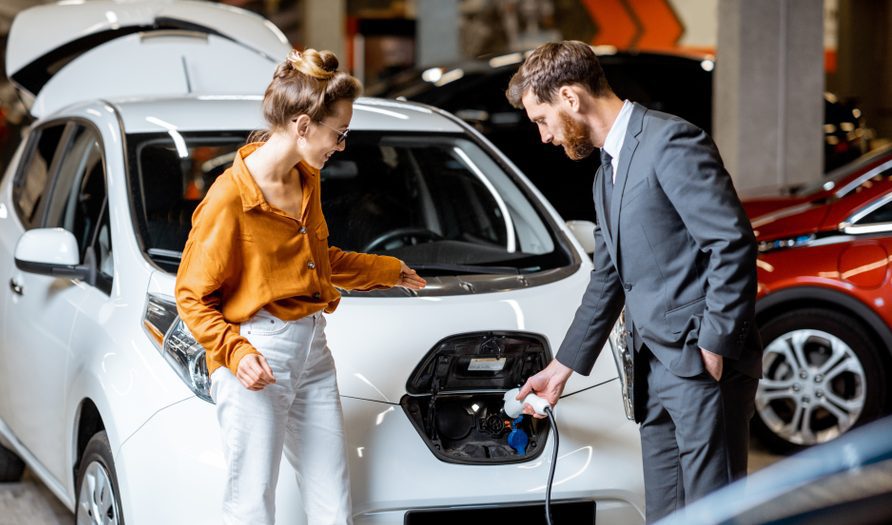Though the idea of electric vehicles (EVs) can be traced back to the 1800s, with over half a million units sold in the first quarter of 2020, it was the Tesla Model 3 that genuinely put electric cars on the map. Fast-forward a year and a half, and all major car manufacturers are trying to cash in on the EV craze.
But what about dealerships that have to distribute their products?
Sometimes lacking the training or willingness to handle EV sales and disrupt a decades-old car-selling model, independent car dealerships are at a crossroads. Some support investing in what major manufacturers and the U.S. government sees as the future of the industry, while others are sticking with the long-standing way of doing business.
Consumer Concerns with EVs
Due to climate-related concerns, the Biden administration is pushing for half of all U.S. car sales to be electric by 2030. Achieving that target will depend on whether the industry can address consumers’ two largest concerns regarding EVs: The infrastructure challenges presented by EVs, and their high purchase prices.
 A recent survey conducted by Consumer Reports found that 71% of U.S. drivers are interested in purchasing an electric car. However, many consumers are reluctant to transition to EVs for several reasons. The same poll found that a little less than half of the respondents who said they have no intention of buying an EV cited a lack of charging stations as the main reason for their reluctance.
A recent survey conducted by Consumer Reports found that 71% of U.S. drivers are interested in purchasing an electric car. However, many consumers are reluctant to transition to EVs for several reasons. The same poll found that a little less than half of the respondents who said they have no intention of buying an EV cited a lack of charging stations as the main reason for their reluctance.
According to Bumper data, since 2017, states like California, Vermont, Massachusetts, Utah, and Colorado are leading the way when it comes to implementing infrastructure for EV charging stations per capita. Louisiana, Mississippi, Kentucky, Alabama, and Indiana lag behind.
The price of EVs is also a problem for drivers. 43% of those surveyed said pricing was the principal issue they have with EVs. Price sensitivity isn’t unique to the U.S., either—a 2020 survey by the U.K.’s Society of Motor Manufacturers and Traders found that even though EV sales had rapidly increased, more than half of U.K. residents expressed concern about the retail prices of electric cars.
EVs cost significantly more than comparable gasoline-powered cars, and as of now, there are few programs in place to make them more affordable. The Chevrolet Bolt, one of the cheapest EVs on the market, starts at $31,000. Pricier models like the Tesla Model S and GMC’s upcoming Hummer EV cost around $80,000 and $105,000, respectively. Meanwhile, federal subsidies and tax credits for EVs are more focused on manufacturers than consumers.
For Rhett Ricart, head of the National Automobile Dealer Association, the transition to EVs is inevitable. However, Ricart said it is essential for EV manufacturers not to overprice their products and request sensible investments from their dealership partners. He also argued that federal tax credit programs, subsidies, and other incentives “will be critical” for the EV industry to take off.
Dealership Staff Concerns with EVs
Apart from the obvious issues facing consumers, some dealerships are also struggling to transition to the EV market.
Inadequate infrastructure, equipment, and training are the primary concerns for dealerships. One study found that a staff’s insufficient experience and knowledge about EVs may discourage potential customers looking to buy EVs.
GM has informed hundreds of its dealers that they must invest $200,000 or more by 2022 to be EV-compatible, or they won’t be able to sell one of GM’s signature brands, the Cadillac, which goes all-electric in 2030.
Ford Motor Company followed suit and made it clear for its thousands of dealerships: to be able to sell their first all-electric Mustang Mach-E, they must run charging stations, obtain EV certificates, and train their employees, among other investments into EV education.
| Related: Ford commits $11.4 billion for shift to electric vehicles |
How Dealership Managers and Owners Can Address These Concerns
For some dealerships, the solution to some of these problems is simply refusing to participate in sales of electric vehicles from major manufacturers. Around 200 dealers who sell Cadillacs decided to opt out of the EV business, refusing to sell electric Cadillacs once they come out.
Nevertheless, some dealerships are deciding to bite the proverbial bullet. Out of approximately 3,000 Ford dealerships, 2,100 have opted to obtain EV certificates, invest in infrastructure, and train sellers and car technicians on the technical and marketing specifications of Ford’s upcoming Mustang Mach-E.
Did you enjoy this article from Alessandro Mannino? Please share your thoughts, comments, or questions regarding this topic by submitting a letter to the editor here, or connect with us at newsroom@cbtnews.com.
Be sure to follow us on Facebook and Twitter to stay up to date or catch-up on all of our podcasts on demand.
While you’re here, don’t forget to subscribe to our email newsletter for all the latest auto industry news from CBT News.










